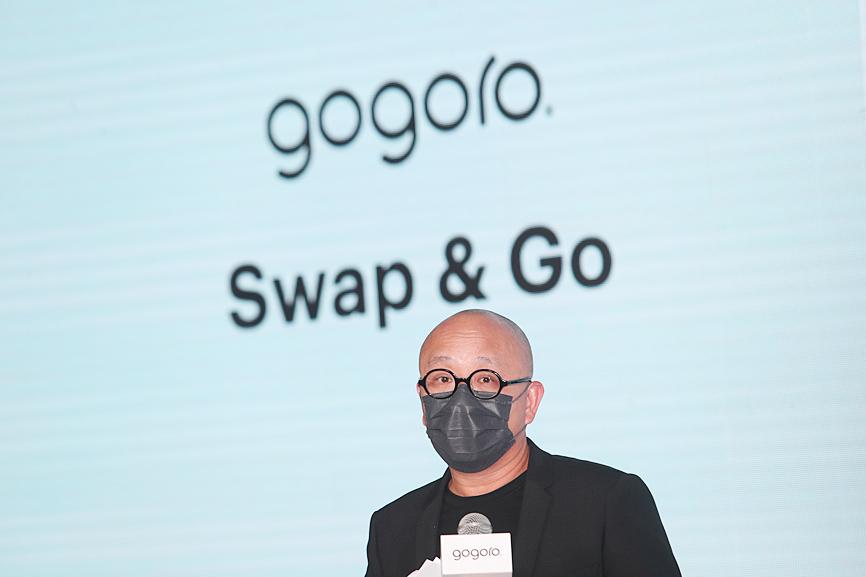Electric scooter maker Gogoro Inc (睿能創意) is to list on the NASDAQ Global Select Market in the US on Tuesday after completing a merger with special-purpose acquisition company Poema Global Holdings Corp, the Taiwanese firm said yesterday.
The merger, announced in September last year, is expected to be completed by Monday, paving the way for the new company, which would retain the Gogoro name, to list on the NASDAQ, the e-scooter maker said in a statement.
Gogoro, which is also a leader in battery-swapping technologies and ecosystems, said that the merger plan was approved at an extraordinary general meeting on Thursday.

Photo: CNA
Poema Global’s shareholders agreed to the merger at their own meeting on the same day, Gogoro said.
Gogoro shares and warrants are to be traded under the symbols “GGR” and “GGROW” respectively, it said.
It has been 16 years since a Taiwanese firm debuted in the US.
Tainan-based Himax Technologies Inc (奇景光電), a fabless IC designer focused on display imaging processing technologies, was the most recent one to do so when it listed on the NASDAQ in 2006.
The merger with Poema Global should raise at least US$335 million in cash, of which US$295 million is to come from private investment in public equity (PIPE) financing commitments received in connection with the deal, Gogoro said.
Top-tier institutional investors and strategic partners that have made PIPE commitments include Engine No. 1, Generation Investment Management, which was founded by former US vice president Al Gore, GoTo Group, Hon Hai Technology Group (鴻海科技集團), Temasek Holdings Pte, Ruentex Group (潤泰集團) and the National Development Fund (國發基金), it said.
After the merger, Poema Global chief executive officer Homer Sun is to join Gogoro’s board of directors.
Gogoro has achieved important milestones last year and this year, such as setting up strategic partnerships with established local leaders to expand in China, India and Indonesia.
Earlier this year, it rolled out its 1 millionth smart battery, and has managed more than 275 million battery swaps to date, the company said.
In January, Gogoro announced a collaboration with Electrum to develop electric-vehicle infrastructure and build an electric-vehicle ecosystem in Indonesia, which is the third-largest two-wheel vehicle market in the world.

SEEKING CLARITY: Washington should not adopt measures that create uncertainties for ‘existing semiconductor investments,’ TSMC said referring to its US$165 billion in the US Taiwan Semiconductor Manufacturing Co (TSMC, 台積電) told the US that any future tariffs on Taiwanese semiconductors could reduce demand for chips and derail its pledge to increase its investment in Arizona. “New import restrictions could jeopardize current US leadership in the competitive technology industry and create uncertainties for many committed semiconductor capital projects in the US, including TSMC Arizona’s significant investment plan in Phoenix,” the chipmaker wrote in a letter to the US Department of Commerce. TSMC issued the warning in response to a solicitation for comments by the department on a possible tariff on semiconductor imports by US President Donald Trump’s

The government has launched a three-pronged strategy to attract local and international talent, aiming to position Taiwan as a new global hub following Nvidia Corp’s announcement that it has chosen Taipei as the site of its Taiwan headquarters. Nvidia cofounder and CEO Jensen Huang (黃仁勳) on Monday last week announced during his keynote speech at the Computex trade show in Taipei that the Nvidia Constellation, the company’s planned Taiwan headquarters, would be located in the Beitou-Shilin Technology Park (北投士林科技園區) in Taipei. Huang’s decision to establish a base in Taiwan is “primarily due to Taiwan’s talent pool and its strength in the semiconductor

An earnings report from semiconductor giant and artificial intelligence (AI) bellwether Nvidia Corp takes center stage for Wall Street this week, as stocks hit a speed bump of worries over US federal deficits driving up Treasury yields. US equities pulled back last week after a torrid rally, as investors turned their attention to tax and spending legislation poised to swell the US government’s US$36 trillion in debt. Long-dated US Treasury yields rose amid the fiscal worries, with the 30-year yield topping 5 percent and hitting its highest level since late 2023. Stocks were dealt another blow on Friday when US President Donald

UNCERTAINTY: Investors remain worried that trade negotiations with Washington could go poorly, given Trump’s inconsistency on tariffs in his second term, experts said The consumer confidence index this month fell for a ninth consecutive month to its lowest level in 13 months, as global trade uncertainties and tariff risks cloud Taiwan’s economic outlook, a survey released yesterday by National Central University found. The biggest decline came from the timing for stock investments, which plunged 11.82 points to 26.82, underscoring bleak investor confidence, it said. “Although the TAIEX reclaimed the 21,000-point mark after the US and China agreed to bury the hatchet for 90 days, investors remain worried that the situation would turn sour later,” said Dachrahn Wu (吳大任), director of the university’s Research Center for